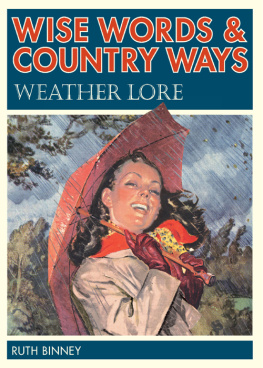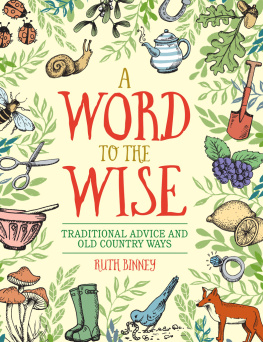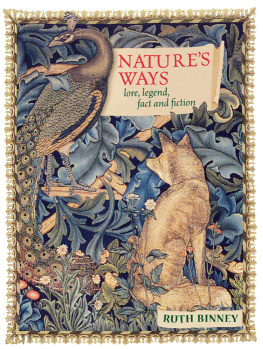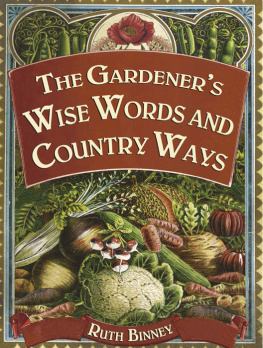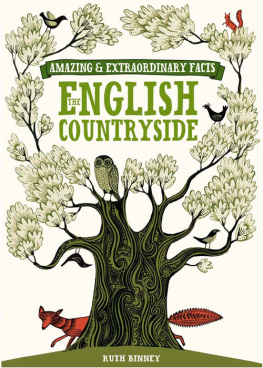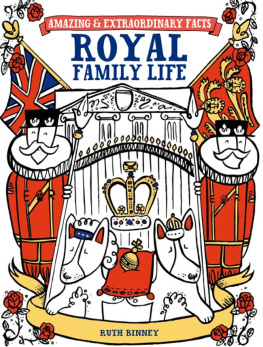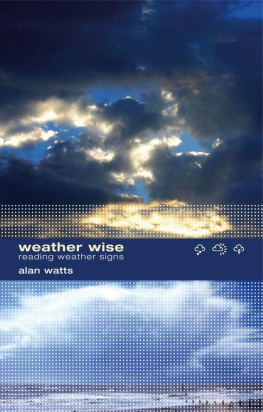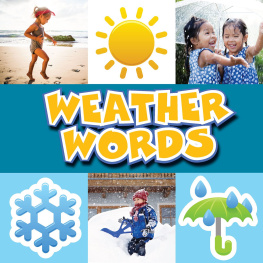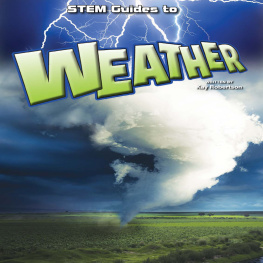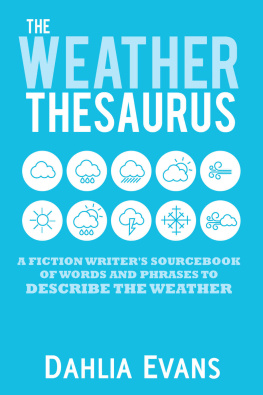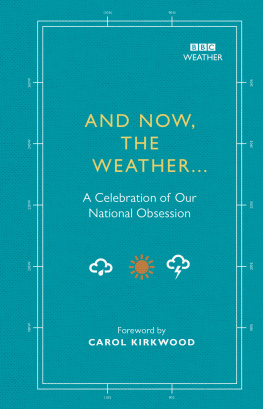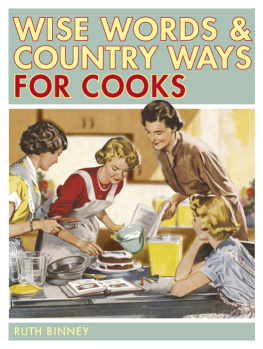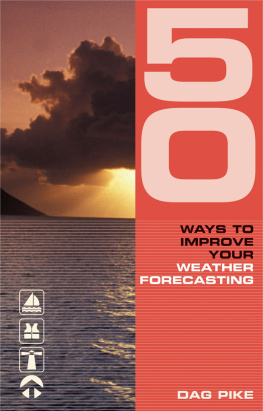INTRODUCTION
It is impossible to live in Britain without being preoccupied by the weather day by day and even hour by hour. For it affects everything, from our moods to our sports and from farmers harvests to the state of our gardens. Given the position of the British Isles, set in the north-east of the Atlantic in the path of the jet stream, the weather is always going to be variable, interesting and hard to predict. In April, for instance, on the first day of the cricket season, we may be either basking in warm sunshine or wrapped in winter woollies wondering whether we are completely mad to be outdoors. We know too that the British summer can range from the proverbial two fine days and a thunderstorm to if we are very lucky week on week of hot sunny weather.
It is hardly surprising that there are hundreds of sayings relating to the weather and its forecasting. The oldest go back to records made on Babylonian tablets in the 12th century bc, including, When a cloud grows dark in the sky, a wind will blow. The Greeks and Romans also preserved many pieces of weather lore. Foremost among Greek forecasters was the physician Aratus, from whom we get an early version of Red sky in the morning complete with mythological references:
Or if Aurora tinge with glowing red
The clouds that float round Phoebus rising head,
Farmer rejoice! For soon refreshing rains
Will fill the pools and quench the thirsty plains.
The first weather saying to make an indelible impression on me as a child was the one that my father would come out with every year on 22 December, the day after the winter solstice. He would look up from his breakfast newspaper and pronounce: As the days lengthen, the cold strengthens. Indeed it does, and another of his favourites, Ring round the moon, snow soon, also contains more than a grain of truth. Since childhood I have delighted in and collected such sayings, so it has given me enormous pleasure to research them in greater depth, delving into their origins and their truth or total fiction! In doing so, I have been helped by one particularly invaluable reference, Weather Lore, first published in 1869. Richard Inwards FRAS, its author and compiler, and at one time President of the Royal Meteorological Society, would doubtless have been acquainted with Admiral Robert Fitzroy, Superintendent of the Meteorological Office, who coined the term weather forecast in 1861. On 1 August that year The Times printed its first Meteorological Office forecast, predicting fine weather across Britain. However, traditional sayings had to suffice for another 11 years, following a barrage of criticism from the Royal Society.
Among the many other references I have used, two deserve particular mention. One is The Country Calendar, or The Shepherd of Banburys Rules, a reprint of the 1827 edition with a commentary by Professor G.H.T. Kimble. The original sayings and observations of one John Claridge, first published in 1670, resulted from some 40 years of experience and record-keeping, with particular reference to the life and needs of the shepherd. The other is The Farmers Friend of 1947 by W.S. Mansfield, director of the Cambridge University Farm, which combines weather sayings with the up-to-date knowledge of the times. My thanks are also due to Neil Baber and his team at David & Charles, and to Beverley Jollands for her assiduous editing.
Today we are as concerned with the long-term future of our climate as with what the weather will do in the next hour or two. As I write this on a wet and chilly late spring Dorset day, towards the end of the coldest winter for 30 years, it is hard to conjure up the prospect and consequences of global warming. But the weather and the climate should concern us all, and while it is amusing to look back to the weather prophets of the past we must also keep our own records of the weather and use them to help become its guardians for the future.
Ruth Binney
West Stafford, Dorset, 2010
CHAPTER 1
COME RAIN OR SHINE
For all those whose livelihoods depend on the weather, making accurate predictions can make all the difference between success and failure and even survival. It is therefore no surprise that many weather sayings relate to such occupations as farming and fishing, gardening and beekeeping. Even in the kitchen and dairy it has long been known, for example, that mayonnaise is more likely to curdle in hot weather and that humidity will affect the delicate process of cheese making.
Many of the sayings in this chapter, although they have ancient origins, are not only true or nearly so but as relevant today as they were in past times. The lives of sailors are still at risk in stormy weather, and farmers, even with modern equipment such as combine harvesters and electric grain dryers, still hope for good weather for ploughing, haymaking and harvest, although even perfect conditions may not prevent them from complaining. Gardeners, too, know that it pays to take account of the state of the season and, to ensure the best crops, to sow and plant by the weather, not according to the date on the calendar.
Even for those who live in cities, the weather and the seasons can profoundly affect their health. The old saying All men are in fair weather happier far still holds true, as evidenced by the number of people who suffer from SAD (seasonal affective disorder) brought on by lack of sunlight in the winter months. And it is always wise to be prepared, with an umbrella to hand, for rain at any time of year.
FROST YEAR, FRUIT YEAR; RAINY YEAR, FRUIT DEAR
An old adage with some elements of truth but far from the whole story. Generally the quality of the fruit harvest depends more on summer and autumn weather than on winter temperatures.
As well as frost, snow is also said to be beneficial to fruit, as in the rhyme Year of snow, fruit will grow. While it does not have a measurable effect, cold weather will certainly help to kill off insect pests such as the blackcurrant big bud mite, which can linger during mild winters. Fungal infections, such as silver leaf of plums, tend to flourish when the weather is mild and damp, whatever the time of year.
For fruit, weather conditions are critical at times of flowering, swelling and ripening. If the weather is warm, and the wind gentle, in late spring and early summer, the blossoms will stay well on trees and bushes and have the best opportunity of being fertilized by bees and other visiting insects. Once the fruit has set, then rain is essential to plump it up.
Come the autumn, sun in September helps ripen fruit and turn its carbohydrates into sweet sugars. For grapes, fine autumn weather is also essential to keep away the mildew that can ruin the crop. The only hazard of late warmth is that it encourages wasps to carry on attacking and eating fruit before it is harvested and stored.
A saying first recorded in the 17th century A cherry year, a merry year; a plum year, a dumb year reflects the special value of the cherry harvest and its traditional association with lifes pleasures (as in the cherry on the cake).
THE FROST HURTS NO WEEDS
A saying that is undoubtedly true, not least because so many weeds are able to survive through the winter. What is more, cold weather may even make the seeds of annual weeds more fertile by enhancing their powers of germination.

